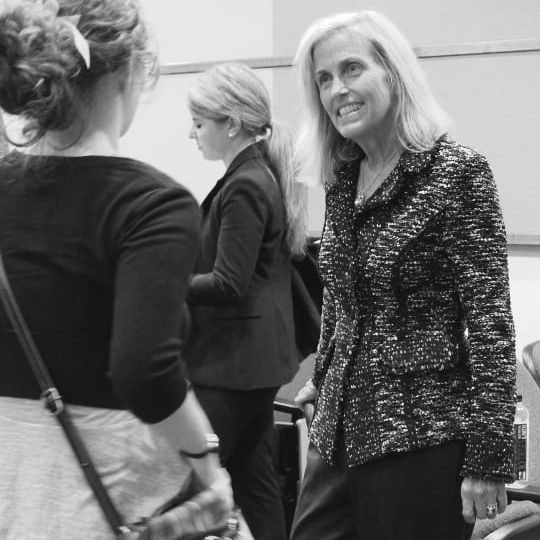
On Friday, April 11, Gretchen Morgenson ’76 gave St. Olaf students interested in both journalism and finance an in-depth look at the professional world in both fields. Morgenson is currently the assistant business and financial editor and writer of the weekly “Market Watch” column for the New York Times.
Morgenson spoke at length about her long and varied career. Aside from her position at the Times, she has also worked as the executive editor at Worth magazine, a business writer and editor at Forbes magazine and as a staff writer at Money magazine. She also gained experience in the financial world as a stockbroker for Dean Witter Reynolds.
“Sometimes the path goes in a lot of weird directions, but if you learn from every experience you had, good and bad, and if you keep in mind what you really enjoy doing, you’ll end up doing what you really love,” Morgenson said.
Morgenson arrived at the New York Times in 1998, where she was able to combine her interest in finance and knowledge of Wall Street with her skills as a journalist. In 2002, she won the Pulitzer Prize for Beat Reporting for her coverage of Wall Street.
The session, which lasted just over an hour, concluded with a question and answer period in which Morgenson addressed the rapidly evolving nature of the journalism industry. Newspapers have declined in popularity in recent years with the rise of the Internet, social media and blogging. The traditional big names in the industry, such as The New York Times and the Washington Post, have had to adjust their business models in order to stay relevant. Nevertheless, she emphasized the importance of journalists and the newspaper industry.
Morgenson herself is an example of the relevance of journalists. Since the financial crash of 2008, she has devoted much of her time trying to uncover the true causes of the financial meltdown. In 2009, she co-authored a book with Joshua Rosner entitled “Reckless Endangerment: How Outsized Ambition, Greed, and Corruption Led to Economic Armageddon,” which explained how oversights by officials in Washington D.C. contributed to the crash.
Morgenson went on to dismiss the idea that newspapers were dying or becoming irrelevant. Reporters, she said, are crucial since they inform the public and uncover abuses by those in power. Financial reporters are especially important in this aspect since they help keep Wall Street relatively honest. While it is true that the industry needs to evolve, there will always be a need for news.
“The Internet has upset the business model, but I think there is still a keen desire for news, and I think the importance of what good journalists do is undeniable as far as shining the light on the dark corners where sometimes bad times happen,” Morgenson said.
bowlin@stolaf.edu

